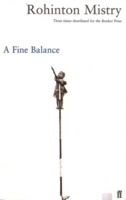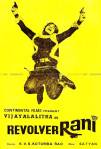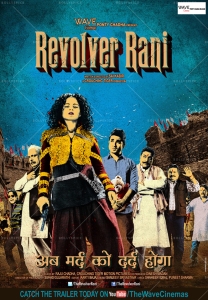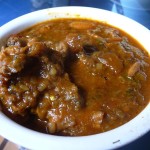 A Fine Balance (1995) is Rohinton Mistry‘s second novel, after Such A Long Journey. It is too long at 600+pages. It is a wonderful book set in Mumbai between 1975-1984 (Indira Gandhi’s Emergency features prominently), but it is still too long. There are numerous histories of the four main characters and their previous generations. It reminded me of Shashi Tharoor’s The Great Indian Novel, and its scope is as large as the Mahabharata.
A Fine Balance (1995) is Rohinton Mistry‘s second novel, after Such A Long Journey. It is too long at 600+pages. It is a wonderful book set in Mumbai between 1975-1984 (Indira Gandhi’s Emergency features prominently), but it is still too long. There are numerous histories of the four main characters and their previous generations. It reminded me of Shashi Tharoor’s The Great Indian Novel, and its scope is as large as the Mahabharata.
The novel is nevertheless interesting and would probably make a good Hollywood movie. It is tragic but not in the Greek tragedy way. Sad and horrible things happen to characters from the beginning to the end with a slim section of happiness and hope in the middle. The four main characters are Dina Dayal (formerly Shroff); her two employees, an uncle-nephew duo of tailors, Ishvar and Omprakash Darji; and her tenant, Maneck Kohlah, son of her friend and studying refrigeration.
Themes: poverty, tragedy, caste (both Ishwar and Om are from a family of Chamars), class (DIna’s life is contrasted with her brother, Nusswan’s), the Parsi community in Mumbai, the Emergency and its effects (especially the forced sterilization, Ishwar is sterilized and Om is both sterilized and castrated), and the injustice of the repressive state measure (law, police, and government). There is also the motif of the connection between tailoring and stitching to life and relationships.
Quotations: Many on life. “A lifetime had to be crafted, just like anything else, she thought, it had to be molded and beaten and burnished in order to get the most out of it” (42). “There was no such thing as private privacy, life was a perpetual concert-hall recital with a captive audience” (56). “It [the past] was a slippery thing, he [Fredoon] discovered, slithering into the present at the least excuse, dodging the strongest defenses” (61). Ibrahim’s obsession with fortune-tellers (87).
Om, “If time were a bolt of cloth,… I would cut out all the bad parts. Snip out the scary nights and stick together the good parts, to make time bearable. Then I would wear it like a coat, always live happily” (310). Maneck, “Did life treat everyone so wantonly ripping the good things to pieces while letting bad things fester and grow like fungus on unrefrigerated food?” (440)
Maneck studied the Beggarmaster at the funeral of Shankar, “Why did humans do that [attempt to hide] to their feelings? Whether it was anger or love or sadness, they always tried to put everything else forward in its place. And then there were those who pretended their emotions were bigger and grander than anyone else’s. A little annoyance they acted out like a gigantic rage; where a smile or a chuckle would do, they laughed hysterically. Either way, it was dishonest” (503).
Ashraf on the death of his wife, Mumtaz, “Time is the twine to tie our lives to parcels of years and months. Or a rubber band stretched to suit our fancy. Time can be the pretty ribbon in a little girl’s hair. Or the lines in you face, stealing your youthful color and your hair. … But in the end, time is a noose around the neck, strangling slowly” (517).
Vasantrao Valmik, the proofreader and lawayer, “The Law is a grim, unsmiling thing. Not Justice, though. Justice is a witty and whimsical and kind and caring” (566)
Popular culture: Dina and Rustom celebrated their first marriage anniversary by seeing Submarine Command, “starring William Holden, who played an American commander on Korea” (43). Second by watching “something less grim,” Bing Crosby’s High Society (43). Om and Ishwar try to return to Nawaz’s house. They chose cinema billboards as landmarks but these “led them astray because all of a sudden there semed to be so many of them. Was it a right turn or a left at the Bobby advertisement? Was it the lane with the poster of Amitabh Bachchan facing a hail of bullets while kickin a machine-gun-wielding villain in the face, or the one with him flashing a hero-type smile at a demure, rustic maiden?” (156). This possibly refers to Namak Haram as it was released in November, 1973, the same time as Bobby. Ishwar and Om are arrested for traveling without tickets but they were actually taking a shortcut towards their huts.”The familiar hoarding loomed into view, but the illustration was different. ‘Hta happened?’ said Om. ‘Where did Modern Bread and Amul Butter go?’ The advertisements had been replaced by the Prime minister’s picture, proclaiming: ‘Iron Will! Hard Work! These will sustain us!'” (180).

 From the Vishram restaurant, Om and Maneck could see “a cinema advertisement on a roof across the road, for a film called Revovler Rani. The billboard was a diptych. The first panel showed four men tearing off a woman’s clothes. AN enormous bra-clad bosom was exposed, while the men’s lips, parted in lewd laughter, revealed carnivorous teeth and birght-red tongues. The second panel depicted the same woman, her clothes in tatters, mowing down the four men with automatic gunfire” (278). This is followed by a discussion between the two on renaming it Machine-Gun Maharani and the image of the actress. Revolver Rani is the also the name of a new film, released in 2014.
From the Vishram restaurant, Om and Maneck could see “a cinema advertisement on a roof across the road, for a film called Revovler Rani. The billboard was a diptych. The first panel showed four men tearing off a woman’s clothes. AN enormous bra-clad bosom was exposed, while the men’s lips, parted in lewd laughter, revealed carnivorous teeth and birght-red tongues. The second panel depicted the same woman, her clothes in tatters, mowing down the four men with automatic gunfire” (278). This is followed by a discussion between the two on renaming it Machine-Gun Maharani and the image of the actress. Revolver Rani is the also the name of a new film, released in 2014.
Sergeant Kesar was a big fan of cowboy films and Clint Eastwood (323). He discusses the films with Dina, asking her if she likes Eastwood films and Dirty Harry. They are “Very good. Highly action-packed dramas. … Dirt yHarry is a top-notch detective. He delivers justice even when the law make sit impossible” (570). Om compares Maneck to AMitabh Bacchan when tries to hit Ibrahim; Ibrahim had come to evict them (433).
Food- Mr. Kohlah’s fondness for carrots after he lost his eye: “carrot juice, carrot salad, carrot-ma-gose, carrots in his pockets as walking companions” (207). Maneck pays for all the snacks and drinks at Vishram “because Om got just enough from Ishvar for one cup of tea” (8). The food: “Batata wada, bhel puri, pakora, bhajia, sherbet” (279).
 A plate of alayti-palayti (chunks of chicken liver and gizzard floated tantalizingly in the thick, spicy sauce” (338)from A-1 Restaurant serves as a way of bonding between Dina and Maneck. He buys it for her and they eat it together when both Om and Iswar were take by the police as a part of the city’s beautification project.
A plate of alayti-palayti (chunks of chicken liver and gizzard floated tantalizingly in the thick, spicy sauce” (338)from A-1 Restaurant serves as a way of bonding between Dina and Maneck. He buys it for her and they eat it together when both Om and Iswar were take by the police as a part of the city’s beautification project.

Dina’s relatives’ ideas for opening a business: butter biscuits, creche, and rose sherbet. “When the tailoring was slow, she filled their orders for cakes, bhakras, vasanu, and coomas” (58).
Colonization: “When these retired brigadiers, majors, and colonels came to tea at the Kohlahs’, they arrived suited and booted, as they called it, with watches in their fobs and ties around their necks. These trappings might have seemed comical to a nationalist bent of mind but had talismanic value for their wearers. It was that stood between them and the disorder knocking at the door. Mr. Kohlah himself was partial to bow ties. Mrs. Kohlah served the tea on Aynsley bone china; the cutlery was Sheffield. If it was a special dinner at Navroze or Khordad Sal, she used the Wedgewood set” (209). Mr. Kohlah: “Consolation was found in muddled criticism of the colonizers who, lacking the stomach fro proper conclusions, had departed in a hurry, though the post-mortem was tempered by nostalgia for the old days” (209).
Politics; “A crowd hung around his [Maneck] friend [Avinash], discussing and arguing about things that he did not understand and was not interested in understanding. Their talk was filled with words like democratization, constitution, alienation, degeneration, decentralization, collectivization, nationalism, capitalism, materialism, feudalism, imperialism, communalism, socialism, fascism, relativism, determinism, proletarianism- ism, ism, ism, ism, the words flying around him like buzzing insects” (244). Prime minster’s visit on 262 “the Prime Minister, in a white sari, was escorted up to the stage by someone in a white kurta and Gandhi cap” (262). “With the Emergency, everything us upside-down. Black can be made white, day turned into night. With the right influence and a little cash, sending people to jail is very easy. There’s even a new law called MISA [Maintenance of Internal Security Act] to simplify the whole procedure” (299).
Mrs. Gupta of Au Revoir Exports on Om and Ishwar are absent because they were put on an irrigation work project and Dina says that they were delayed because they had fallen sick in their village, ‘That’s what they all say. Too many production days are lost to such excuses. probably drinking and dancing in their village. We are Third World in development, but first class in absenteeism and strikes” (351).
Resources:
- Summary on Let’s Talk Bollywood.
- Teaching it in class, an essay.
- Interview in January Magazine.
- Book review in The Guardian.
- Book review in The New York Times.
- Parsi dishes to try.
- Parsi recipes: here and here.
Mistry, Rohinton. A Fine Balance. London: Faber and Faber, 1997.